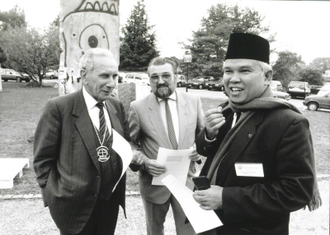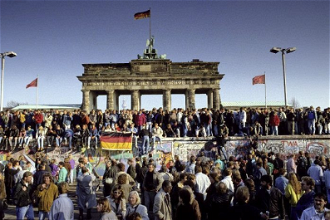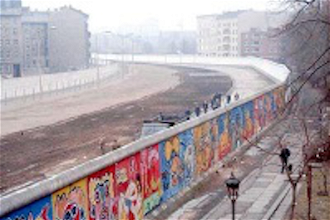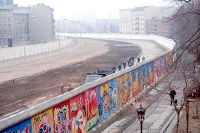Reflection: Walls of separation could not reach the heavens

l-r: Late Dr Emilio Castro, Jean Fischer, Dr Soritua Nababan at unveiling ceremony of Berlin Wall fragment Geneva, 1991. Photo: Peter Williams/WCC
"We realised that reconciliation is a gift from God that we must seek with perseverance and humility, so that it frees us in our relationships with the other". Jean Fischer, former general secretary of the Conference of European Churches shares the following reflection on the occasion of the 30th anniversary of the fall of the Berlin Wall. Fischer comes from Switzerland and was CEC general secretary from 1987 to 1997.
On 9 November 1989, thirty years ago, news that the Berlin Wall had fallen surprised the world. It was a happy news. It was hopeful and incredible news, although long awaited. The fall of the wall had the crowds in jubilation celebrating reunion, victory and freedom.
The events that preceded the fall of the wall totally transformed the European landscape.
The churches prayed and worked for decades for the opening of the borders and the respect for human rights. Therefore, it was the right time for European churches to cooperate even more firmly with Organization for Security and Co-operation in Europe to achieve the objectives of the Helsinki Final Act, 1975, and the Vienna Document of 1989 for lasting peace and cooperation instead of separation.
We then realised that a new Europe was emerging. Before our very eyes, everyday new elements appeared, sometimes happy and welcome, other times disturbing and threatening. The elements of concern included the rise of nationalism, thirst for revenge, triumphalism of political, economic, and even religious forces, seeking to take advantage of the void caused by the transition to establish new positions of power and domination.
In this new Europe, with its still vague characteristics, we could already hear the cries of the future victims of unemployment, those left behind by the law of the market economy, a system, where the strongest dominated the weakest. The situation was as much a source of hope as it was of complex challenge.
When the wall fell we had the vision of a "common European house". A house, with some dilapidated as well as luxurious areas. An open house, a welcoming and hospitable haven, with no discrimination. A house where no one would be afraid to tell the truth, where the daily bread is shared equally, and a house where dialogue would prevail and not violence.
A house open to the world, neither a ghetto nor a private club, but one that affirms solidarity with the peoples of other continents, a common house where the churches would demonstrate their unity and avoid the temptation to repeat the models of the past.
CEC and the challenge of "new Europe"
A few months later, CEC convened an extraordinary meeting in Geneva, March 1990, with European church leaders, representatives from CEC Member Churches, the World Council of Churches, the Council of European Bishops' Conferences of Europe (CCEE) and other ecumenical bodies. At the time, when the climate was still euphoric following the fall of the Berlin Wall and the Iron Curtain, the turmoil actually on the "construction site" of the new Europe was causing worries. The collapse of the communist regimes was continuing. We were already noticing cracking ice of the Cold War that could bring the opposite of a harmonious spring.
Participants were convinced that churches in Europe should strive to maintain and develop cohesion, unity and solidarity established over the years since 1959. They asked CEC to develop a conciliatory process promoting peace, justice and safeguarding creation. In those challenging critical times they affirmed that the churches, which were again finding their place in society, had the right and responsibility to make ethical and moral judgments on the new political, economic and scientific realities and their social consequences.
In his opening speech, CEC President of that time Patriarch Alexy II of Moscow urged the European churches to carry out a "transformation process of reconciliation".
This very relevant request led CEC and CCEE to prepare a second European Ecumenical Assembly, with the theme "Reconciliation - Gift of God and Source of New Life". Eight years after the fall of the Berlin Wall, more than ten thousand participants, a majority of them from the East, gathered in Graz in 1997 to discuss this significant theme.
We were aware that reconciliation is a difficult task - it does not come naturally. We were also aware that churches had often been and continue to be ambiguous about reconciliation. Distrust and fear disfigures unity in Christ and prevents its liberating power from being manifested. Yet we realised that reconciliation is a gift from God that we must seek with perseverance and humility, so that it frees us in our relationships with the "other".
The task of the churches is immense. Divisions and separations between, and within European countries multiply, while we wait for peace and justice. The cruelties of war have reappeared and the wounds are far from being healed.
Even today, Europe has not reconciled with itself, other old walls persist, new walls are being built, which is the fruit of fear and stupidity. These walls bear the marks of inhumanity. They are found on all continents. Who feels outraged by this? Who will destroy them?
A piece of Berlin Wall in the Ecumenical Centre
In the Ecumenical Centre garden in Geneva, on the hill overlooking the Palais des Nations, there are two pieces of Berlin Wall, one rising straight and the other lying on the ground.
A few days after 9 November 1989, during a visit to express solidarity to the President of the German Democratic Republic (GDR) Council of the Protestant Churches, we discussed many topics related to the new situation. This included discussing ways to remove the tons of concrete and debris that made up the now useless wall.
At the end of our discussion, I jokingly suggested that one or two parts of the wall should be reserved for CEC. Thus it was a year later, a colonel of the German army called me in my home one evening to let me know that the two pieces of the wall, reserved for CEC, were available in Berlin and had to be collected very quickly. This was done!
This improvised memorial has found its place at the Ecumenical Centre, so that visitors from all over the world and the future generations can remember the many victims of this horrible symbol of the Cold War and the Iron Curtain. The piece of the wall is there, so that we all may remember that the walls of the separation could not reach the heavens.


















